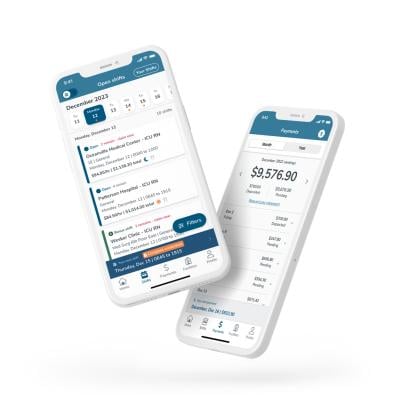Caire Health’s Upliv launched right as menopause care was entering the zeitgeist. How was Caire, a Northwell Health and Aegis Ventures joint enterprise, ahead of the curve with their digital health menopause offering? They asked Northwell health system employees.
The question did not come directly from the perspective of women’s health but rather workforce retention. Between 2020 and 2021, the percentage of clinicians experiencing burnout doubled to 62.8%. But with one in four women who experience symptoms of menopause considering early retirement and 76% of all healthcare jobs being held by females, women’s health and workforce retention go hand in hand, according to Tom Santo, M.D., Caire CEO and chief growth officer.
“When we first asked the question of the workforce an overwhelming response from over 900 employees said menopause was top of mind for them,” Santo told Fierce Healthcare. “We got the voice of the patient really early in the process, and that's reflected in the product that we built.”
Caire Health is a virtual care company creation platform forged through a collaboration between Aegis and Northwell Holdings, a subsidiary of the New York-based health system. The creation of Upliv marks a trend of healthcare organizations partnering with digital platforms to improve worker retention.
Upliv is a virtual care startup offering clinical menopause support as an employee benefit. Through a pilot program with Northwell, select nurses experiencing perimenopause and menopause will gain access to the platform before a full rollout takes place this year, executives said.
Northwell is New York state’s largest provider and measures its workforce as 70% female. Of women experiencing menopause symptoms, 73% are left untreated for the 10-to-15-year menopause journey. For this reason, Santo said, the cliché of tech moving fast and breaking things or going for the fast grab will not work. This, he said, is where digital partners can adopt a healthcare mindset.
“Health systems are treating a community over decades, if not centuries,” Santo said. “So they're always thinking about the long game as they think about their patients. And so, we're just trying to adopt that mindset as a partner in delivering that care.”
Gregg Nevola, vice president of total rewards at Northwell Health, told Fierce Healthcare that throughout the design and implementation process, wellness coaches, nutritionists, physicians and nurse practitioners all contributed to the conversation and design of the final digital product.
Nevola sees Upliv as only the beginning of imagining how to better address burnout. Northwell has created programs offering caregiver facilities for employees caring for other family members, whether they be children or older family members.
“It's an opportunity for us as a society to think about different ways that we could impact our communities and our team members,” Nevola said. “It leads us to some of our pay equity strategies and our paid time off programs. We talk a lot about our work-life balance. If clinicians are able to focus more on their job without having to worry about these other challenges, they're able to do a better job with our patients, which allows us to provide better care for our communities.”
How digital health supports flexible scheduling for nurses
A 2022 study from the American Medical Association, Mayo Clinic and Stanford Medicine found that one in five physicians and two in five nurses intend to leave their practice altogether.

CareRev is seeking to provide a new flexible option for nurses, a segment of the healthcare workforce experiencing the highest burnout rates. The platform's founder Will Patterson is a former ICU nurse and sought to reflect the nursing culture of prioritizing flexibility into scheduling the nursing shifts.
He saw the new offering as a one-two punch addressing burnout. Nurses being scheduled would gain flexibility along with the ability to easily pick up extra shifts while nurse managers would decrease their tedious work.
Following the end of the pandemic, he sees new nurses entering the field prioritizing flexibility and travel even more than the generations before. One age bracket up and you have the sandwich generation caring for children and older relatives. Then you have a retiring population that doesn't want to work full-time.
The beginning of the pandemic marked the end of a six-year decline in work-induced burnout among physicians, according to the American Medical Association.
“From a cultural perspective, I think all we're doing is matching where the labor is now,” Patterson told Fierce Healthcare. “The pandemic kind of accelerated it with the great resignation and the number of people that are looking to leave the workforce. The healthcare systems who are thinking this way and using technology to back it up are ahead of the ballgame.”
Sylvain Trepanier is the system chief nursing officer for Providence and partnered with CareRev to have more flexibility to fill stray shifts quickly and easily. Currently, nursing is a metaphorical two-legged stool held up by staff nurses and travel nurses. CareRev provides the third leg, a robust, local workforce that can plug schedule holes quickly, he said.
Additionally, 86% of nurses are women. As independent contractors on the platform, three 12-hour night shifts can be avoided when children are young. Patterson pointed out that some male-dominated specialties with similar salaries to nurses like podiatrists can be independent contractors and make their own schedule while nurses have historically not had the same flexibility.
“In a traditional hospital setting, there has been a paternalistic approach on how physicians viewed nurses,” Trepanier said. "There are more female positions than there are male positions now, and that will help change how both professions are now perceived and [treat] each other. I believe that over time will impact how we treat people and what we ask them to do.”